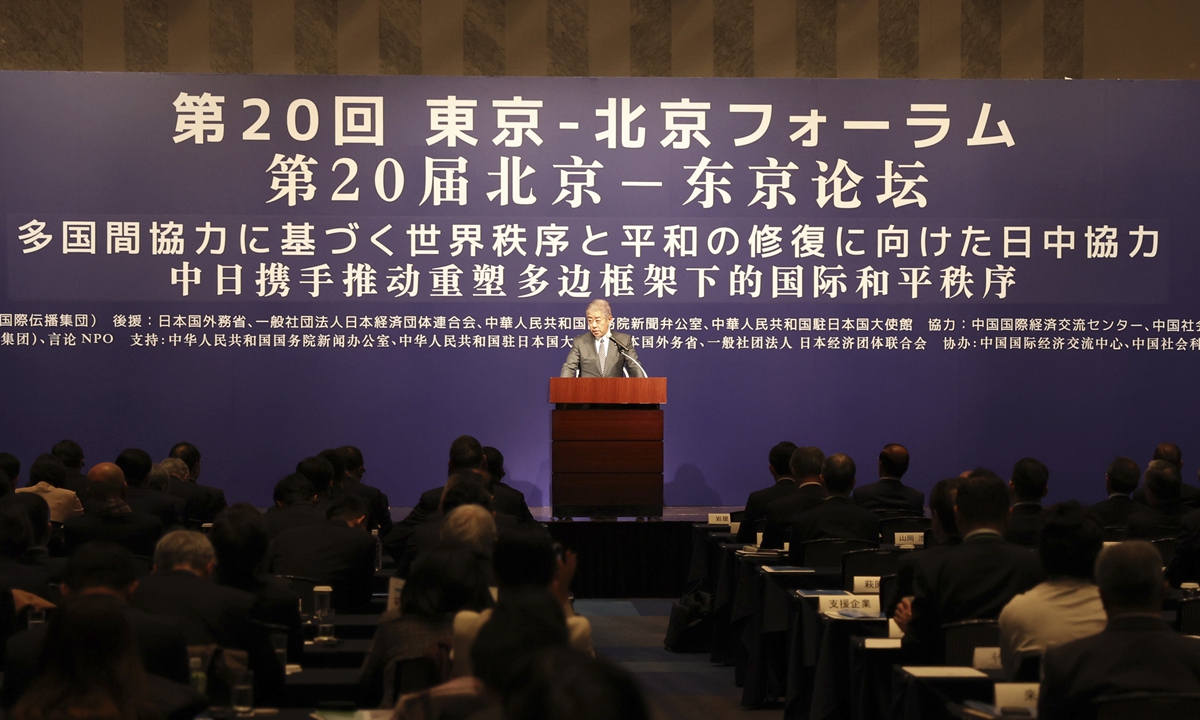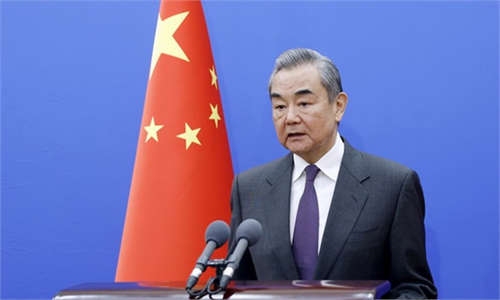Japanese FM Iwaya's visit to China highlights continuing momentum in bilateral relations stabilizing and warming up
Trip continues stabilizing and warming momentum in bilateral relations: expert

Japanese Foreign Minister Takeshi Iwaya delivers a speech at the 20th Beijing-Tokyo Forum in Tokyo on December 4, 2024. Photo: VCG
Japanese Minister for Foreign Affairs Takeshi Iwaya is invited to visit China on December 25. Member of the Political Bureau of the Communist Party of China (CPC) Central Committee and Minister of Foreign Affairs Wang Yi and Foreign Minister Takeshi Iwaya will hold foreign ministers' talks and attend the second meeting of High-Level Consultation Mechanism on People-to-People and Cultural Exchanges between China and Japan, Chinese Foreign Ministry spokesperson Mao Ning announced on Tuesday.
China attaches importance to Foreign Minister Iwaya's visit, Mao said during a regular press conference on Tuesday, adding that China stands ready to work with Japan to focus on common interests, enhance dialogue and communication, deepen practical cooperation, properly manage and control differences, fully advance the strategic relationship of mutual benefit, and build a constructive and stable China-Japan relationship fit for the new era.
Iwaya's visit continues the momentum of China-Japan relations stabilizing and warming up, which is mainly attributed to the relatively pragmatic policy toward China adopted by Japan's new cabinet under Prime Minister Shigeru Ishiba, said a Chinese expert.
In November this year, President Xi Jinping and Prime Minister Shigeru Ishiba held a meeting on the sidelines of the APEC Economic Leaders' Meeting in Lima. They agreed to maintain high-level exchanges and make good use of high-level dialogue mechanisms in the fields of economy and culture, Mao said when introducing the background and program of this visit.
China attaches importance to Foreign Minister Iwaya's visit. Chinese leader will meet with him. Foreign Minister Wang Yi will hold talks with him and they will jointly attend the second meeting of the High-Level Consultation Mechanism on People-to-People and Cultural Exchanges, Mao said.
China stands ready to work with Japan to focus on common interests, enhance dialogue and communication, deepen practical cooperation, properly manage and control differences, fully advance the strategic relationship of mutual benefit, and build a constructive and stable China-Japan relationship fit for the new era, Mao added.
This is Iwaya's first visit to China as Japan's top diplomat, according to Kyodo News. The last time a Japanese foreign minister traveled to China was in April of last year when Yoshimasa Hayashi made the trip, according to the report.
The two sides may exchange views on promoting exchanges through visa policy relaxations and other issues, according to NHK. The report also said that the Japanese side hopes to take the foreign minister's visit to China as an opportunity to effectively improve relations between the two countries.
China and Japan launched the high-level consultation mechanism on people-to-people exchanges in November 2019, with both sides vowing to push for greater development of people-to-people and cultural exchanges between the two countries in the new era, Xinhua reported.
The visit by the Japanese foreign minister continues the momentum of China-Japan relations stabilizing and warming up since the second half of this year, Xiang Haoyu, a research fellow at the China Institute of International Studies, told the Global Times on Tuesday.
The improvement in relations can be attributed to the relatively pragmatic policy toward China implemented by Japan's new cabinet under Shigeru Ishiba, Xiang said.
Against the backdrop of rising uncertainty about US foreign policy coming with the new administration, the Japanese government needs to make relatively balanced policy adjustments between China and the US in order to hedge its risks, Xiang added.
Xiang added that China and Japan can find common ground in countering US trade protectionism, which could serve as an external factor to promote the improvement of China-Japan relations.
The visit focuses on people-to-people exchanges and cooperation between the two countries, possibly encompassing various areas including culture, education, tourism and youth engagement, and this is expected to positively impact the sentiments of citizens from both countries, enhancing understanding and trust, Xiang said.
During Iwaya's visit, the two sides are expected to affirm China's readiness to lift a ban on imports of Japanese seafood, which was imposed due to the discharge of treated radioactive water from the crippled Fukushima Daiichi nuclear power plant into the sea, Kyodo News claimed.
On the issue of the discharge of Fukushima nuclear-contaminated water into the sea, what matters the most is Japan's earnest fulfillment of its own promise, Mao Ning said on Tuesday in response to media reports suggesting that the Chinese government is considering resuming imports of Japanese aquatic products starting from the first half of 2025.
After China participates substantively in the long-term international monitoring and the independent sampling and other monitoring activities are carried out, China will begin to adjust the relevant measures based on scientific evidence and gradually resume imports of Japanese aquatic products that meet the regulation requirements and standards. China's opposition to Japan's discharge of Fukushima nuclear-contaminated water into the sea remains unchanged, Mao added.

